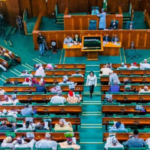Stakeholders in the health sector have called on the 10th National Assembly to pass the Public Health Emergency bill 2023 and other pending health bills into law.
They made the call in Abuja during the dialogue session on strengthening Nigeria’s emergency preparedness and response legislative reforms, organised by the Legislative Initiative for Sustainable Development (LISDEL) and the Global Health Advocacy Incubator.
Chairman of the 9th Assembly’s Senate Committee on Health, Senator Ibrahim Oloriegbe said the bill was passed by the immediate past assembly but was not signed into law by the president.
He also called for the amendment of the NCDC Act, and the need to improve animal disease control for effective response.
- Nigeria needs ambassadors
- Capital market can galvanise funds to finance Nigeria’s infrastructural deficit – SEC
The director general of the NCDC, Dr Jide Idris said the bills awaiting presidential assent are the Public Health Emergency Bill, 2023, the National Health Act (Amendment) 2023 and the NCDC Act (Amendment) Bill, 2023.
He explained that the Public Health Emergency Bill 2023, aims to repeal the Quarantine Act , establishes a comprehensive framework to prevent the entry and control of the spread of infectious diseases in Nigeria, creates a coordinating mechanism called the “ Public Health Emergency Task Force “and also establishes the public health emergency fund. He said laws are foundational to effective public health practice, adding that “As countries strive to achieve global health security, international and national legal reforms can play a critical role in assisting governments with improving their health infrastructures and operations.”
He said that the NCDC Act (Amendment) Bill 2023 will strengthen the NCDC in its role of preventing, detecting and responding to disease outbreaks and public health emergencies or health events. He also said national and sub national legislative networks have a crucial role to play in strengthening epidemic preparedness and response (EPR) through strategic legal reforms, resources appropriation for EPR, redressing citizen’s engagement, and constituent engagement on building a resilient health system.
Chairman Senate Committee on Primary Health and Communicable Diseases, Dr Ibrahim Lamido said the country’s public health legislative framework requires urgent reforms to address inadequate funding and resource allocation, insufficient healthcare workforce and capacity building, limited access to healthcare services, especially in rural areas , and inadequate emergency preparedness and response protocols.
He called on policymakers to conduct a comprehensive review of the public health laws and policies and engage stakeholders in developing evidence-based legislative reforms, among others.

 Join Daily Trust WhatsApp Community For Quick Access To News and Happenings Around You.
Join Daily Trust WhatsApp Community For Quick Access To News and Happenings Around You.


